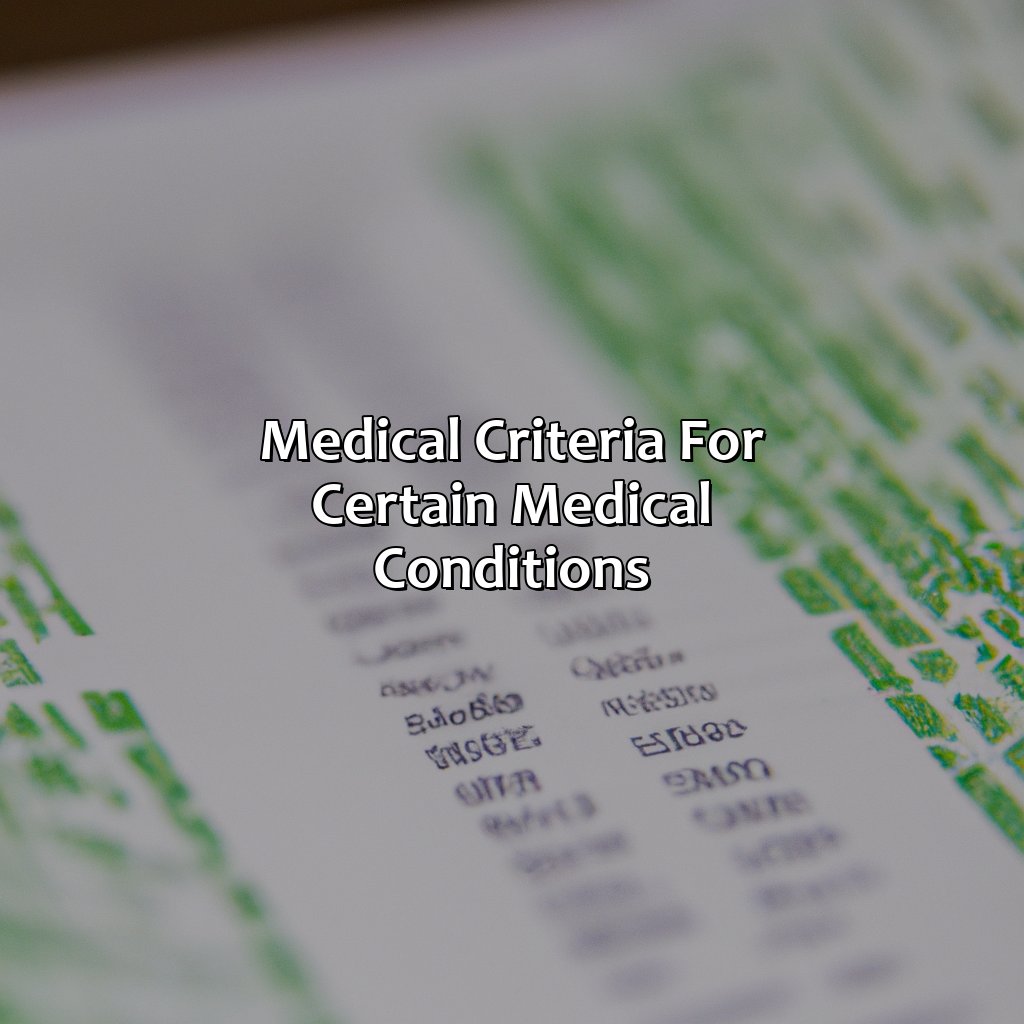What Disability Qualifies For Social Security?
Key Takeaway:
- Disabilities that qualify for Social Security include both physical and mental conditions that prevent a person from engaging in substantial gainful activity. These conditions must be expected to last for at least 12 months or result in death.
- The Social Security Administration uses a “Blue Book” with specific criteria to determine if a condition qualifies for disability benefits. This includes medical criteria for musculoskeletal and cardiovascular conditions, as well as non-medical criteria such as age, education, work experience, and financial ability to support work.
- Filing for Social Security disability benefits involves an initial application process, appeals and hearings, and the possibility of hiring an attorney or representative to assist with the process.
Are you in search of benefits for a disability? Do you want to know what disability qualifies you for Social Security? Look no further – we have the answers you are looking for. You deserve the right to a better quality of life, and we will help you make that a reality.
Qualifying Disabilities for Social Security
Qualify for Social Security Disability Benefits
Social Security Disability benefits are for individuals with severe disabilities that are expected to last for at least one year and prevent them from working.There are specific criteria that must be met to qualify for Social Security Disability benefits. These include the severity of the disability, length of disability, and inability to work.
The Social Security Administration maintains a list of medical conditions that qualify an individual for disability benefits. If your medical condition is not on the list, you may still be able to qualify for benefits if you can show that your condition is equivalent in severity to a listed condition.
It is important to note that having a specific diagnosis does not automatically qualify an individual for Social Security Disability benefits. The burden of proof lies with the applicant to demonstrate that their condition meets the criteria for disability benefits.
Pro Tip: Consult with a social security disability lawyer to help you properly prepare your application and increase your chances of approval.

Image credits: retiregenz.com by David Duncun
Medical Criteria for Certain Medical Conditions
Medical Eligibility Requirements for Social Security Disability
Medical eligibility for Social Security Disability benefits depends on the type and severity of the medical condition. The Social Security Administration uses a comprehensive set of criteria to determine disability, including the medical criteria for certain medical conditions.
To provide an overview, we have created a table with the medical conditions and their specific listings for eligibility. This table includes information on conditions such as musculoskeletal disorders, neurological disorders, and mental disorders, and the severity required for eligibility.
Additionally, it’s essential to understand that the Social Security Administration considers both physical and mental impairments when determining eligibility. They also evaluate an applicant’s ability to perform basic work-related activities and how their disability affects their daily life.
To increase eligibility chances, individuals should provide thorough medical records and documentation of their condition, including test results, treatment plans, and physician notes. It’s also helpful to consult with a legal professional experienced in Social Security Disability to navigate the application process effectively.

Image credits: retiregenz.com by David Duncun
Non-Medical Qualifying Disabilities
For individuals with disabilities, obtaining social security benefits can provide much-needed assistance. While medical conditions are the primary factor in determining eligibility, non-medical criteria can also qualify an individual for benefits. These factors may include an individual’s age, income level, and work history, along with their disability.
When it comes to non-medical criteria, age is an important factor. For example, individuals must be at least 18 years old to qualify for disability benefits. In addition, an individual’s income level and work history can also make them eligible for benefits. For example, a person who has not worked enough to earn social security credits may still qualify if they have a low income and limited resources.
It’s important to note that the specific non-medical criteria that qualify an individual for benefits can vary depending on the type of disability they have. For example, a person with a mental health condition may be required to meet different non-medical criteria than an individual with a physical disability.
In order to determine whether an individual is eligible for social security disability benefits, it’s important to consult with an experienced disability advocate or attorney. These professionals can help guide individuals through the application process and ensure that they have the best chance of obtaining the benefits they need.
If you or someone you love is disabled and struggling to make ends meet, don’t let fear prevent you from seeking the help you need. By understanding the non-medical criteria that may qualify you for social security benefits, you can take steps to improve your financial outlook and provide for yourself and your family.

Image credits: retiregenz.com by James Woodhock
Filing for Social Security Disability Benefits
Filing for Social Security Disability Benefits can be a lengthy and complex process. The first step is to determine if you meet the eligibility requirements for disability benefits. This includes having a medical condition that meets Social Security’s definition of disability, which is an impairment that prevents you from performing substantial gainful activity and is expected to last for at least 12 months or result in death.
To support your claim, you will need to provide detailed medical records as well as information about your work history and limitations. It is important to note that the Social Security Administration denies a large percentage of initial claims, so it may be necessary to appeal the decision through the disability appeals process.
It is advisable to seek the assistance of a qualified attorney or representative who can guide you through the process and help you present a strong case. Additionally, it is important to keep up-to-date with any changes in the process or eligibility requirements.
Pro Tip: Be sure to keep detailed records of medical appointments and procedures, as well as any communication with the Social Security Administration. This can greatly assist in your case and help ensure a favorable decision.

Image credits: retiregenz.com by Adam Duncun
Five Facts About Disability Qualifications for Social Security:
Social Security Disability Insurance (SSDI) provides benefits to individuals who have worked in jobs covered by Social Security and have a medical condition that meets their definition of disability. (Source: SSA.gov)
To qualify for SSDI, the individual must have a medical condition that is severe enough to prevent them from performing the work they did before and that it is expected to last at least one year or result in death. (Source: SSA.gov)
Supplemental Security Income (SSI) pays benefits to disabled adults and children who have limited income and resources. (Source: SSA.gov)
The medical condition must be included in the SSA’s list of disabling medical conditions to qualify for benefits, or it must be severe enough that it meets or equals a listing. (Source: SSA.gov)
The application process can be lengthy, and many initial applications are denied, but applicants can appeal the decision and have a hearing with an administrative law judge. (Source: Nolo.com)
FAQs about What Disability Qualifies For Social Security?
What disabilities qualify for Social Security?
There are several types of disabilities that may qualify you for Social Security benefits, including:
- Physical impairments
- Mental health conditions
- Chronic illnesses
- Neurological disorders
- Vision or hearing loss
- Speech impairments
How severe does my disability need to be to qualify for Social Security benefits?
Your disability must be severe enough to prevent you from doing the work you did before and also from adjusting to other work. It must also last for a minimum of 12 months or result in death, according to the Social Security Administration.
What documentation do I need to provide to prove my disability?
In order to prove your disability to the Social Security Administration, you will need to provide the following documentation:
- Medical records
- Lab results
- Doctor’s notes
- Treatment plans
- Work history
Are there any disabilities that automatically qualify for Social Security benefits?
Yes, there are some disabilities that automatically qualify, but they are very rare. These include:
- ALS (Lou Gehrig’s disease)
- End-stage renal disease (requiring dialysis or transplant)
- Chronic liver disease with loss of liver function
- Severe muscle damage (rhabdomyolysis)
What should I do if my disability claim is denied?
If your disability claim is denied, you can appeal the decision with the help of a Social Security disability lawyer. They can help you gather additional medical evidence, prepare for the hearing, and argue your case before an administrative law judge.
Can I work and still receive Social Security disability benefits?
Yes, you can work and still receive Social Security disability benefits, but there are certain limitations. The Social Security Administration has a trial work period program that allows you to test your ability to work for up to nine months while still receiving benefits. However, if you earn more than a certain amount per month ($1,260 in 2020), your benefits may be reduced or discontinued.
 Checkout this IRS Loophole
Checkout this IRS Loophole 
